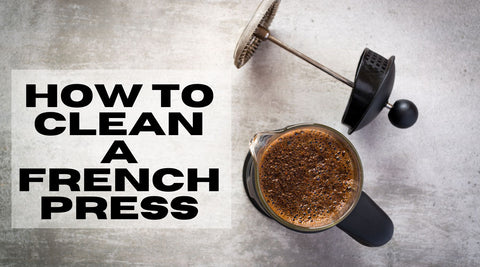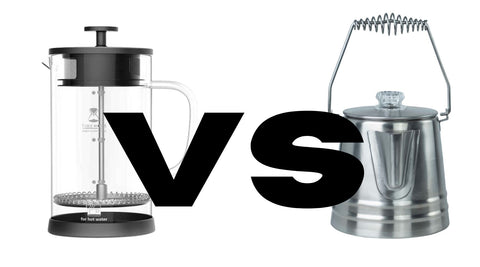How To Clean A French Press: Chic and simple
If you thought making coffee with French press would be a nightmare because of all the extra accessories or tools needed, or even worse, the cleaning that comes after then you are in luck. French press coffee maker cleaning is as easy as you wished it were, and in only a handful of steps (and some trusty baking soda) you can enjoy your perfect cup of coffee without the fear of cleaning your French press coffee maker afterward.
Why do I need to clean my French Press?
If you are an avid coffee drinker then you wouldn't want to settle for a less than well-balanced, flavorful cup of coffee in the morning. Like with anything you want to start with a clean vessel, and even more, so your French press delivers such decadent coffee.
Would you make your coffee in a dirty cup? I think not, so why use a French press that still has the remaining coffee grounds in it from before? Coffee oils and coffee grounds cling to the fine strainer, or mesh sieve, and impart their already extracted flavors into the brewer walls and filter. These then, unlike a paper filter which is disposed of after use, build up on the mesh sieve and can become over-extracted causing the coffee to taste bitter.
If you want a great cup of coffee (especially if you only have one cup a day), clean your French press, it is as simple as that.
How To Clean A French Press: Easy Steps
Many French presses are made with dishwasher-safe glass, but if you are washing by hand in the sink then take note of how to clean a French press daily (not just a rinse) as well as a deep clean where some elements can soak overnight.
Step1: Remove Coffee Grounds
Because of the press mechanism most of the grounds will be compacted at the bottom of the glass carafe. Remove the remaining coffee grounds with a plastic or wooden spoon, do not use a metal spoon as it will scratch or break the glass carafe.
You may think it is only a few grounds but any coffee grounds that have already been brewed need to be removed from your French press before you add more coffee.
How do you remove sludge from a French Press?
Sometimes the finer grind coffee seeps through the French press filter which can cause sediment at the bottom of the vessel. This could be because you did not grind your coffee beans to a coarse grind size but rather too fine.
If there is a significant amount of sludge in your French press consider increasing the distilled white vinegar to water ratio to break it down. Then rinse with liquid dish soap (with a spoon of baking soda if it is a lot) and hot water. The distilled white vinegar is a great sanitizer too, and the hot water will leave your glass carafe sediment free and refreshed.
Side thought
You could always leave the carafe in the sink with baking soda to soak overnight, and then press the plunger down the next morning into it with hot water. The used grounds should have broken down and dissolved with the soda.
Step 2: Disassemble all parts of the French press and soak
Once all the ground coffee has been removed you want to break down your French press parts and let them sit in the sink in some soapy water to get that deep clean. The soap will help dissolve oils, breaking down fats, and with an added sprinkle of soda it begins to foam so you know the magic is happening.
Step 3: Scrub It
Most French presses are made with glass so use a soft sponge or bottle brush to clean it. Be sure to keep the parts low in the sink as the soapy water can make the glass slippery, then clean your French press with a few scrubs and press the plunger up and down inside with hot water to deep clean.
Should I wash my French press with soap?
When you clean your French press with hot water, baking soda, or soap you want to try to not use too much, but ideally, a soapy water combination that has a degreaser in it. Rinse the press and the remaining parts in the sink till the hot water runs clear, don't use cold water as the sudden temperature change will crack the carafe.
Step 4: Let Dry
When you rinse each part with hot water place it on a paper towel in a safe place so it can air dry completely. Many coffee shop owners do all the deep cleaning at the end of the night and leave it on a drying rack to air dry till the next day. Essentially you should let your clean French press cool and dry naturally. You don't want to dry it with a paper towel as it can stick to the filter and glass, but if you need to reuse it straight away opt for a microfiber cloth instead.
Do you clean a French Press every time?
The coffee oils and leftover grounds and brewed coffee can quickly turn rancid in your French press coffee maker and will certainly affect your next cup of coffee. A few drops of dish soapy water and a sponge or bottle brush will make the job done quickly and easily. The last thing you want is to look forward to a delicious coffee only for it to be ruined by leftover oils or coffee grounds from your previous cup of coffee. No, thank you.
Unlike regular drip coffee makers that can be deep cleaned every 3 months if used regularly, you do want to wash your French press daily after use as you would a pour-over.
Can you use vinegar to clean the French press?
Yes, you can. Ideally, you want to use equal parts vinegar and warm water and wash the disassembled French press coffee maker parts to eliminate build up. Then give it a quick rinse, and I like to do another sponge over for deeper cleaning with some warm water and dish soap to be sure it is properly clean.
Using vinegar (white vinegar is preferable to rule out staining) when cleaning your French press helps to prevent hard water buildup. Lastly, be sure to give everything a thorough rinse. Leave the components to air dry completely on the drying rack before putting them back together.
Can I put my used coffee grounds in the garbage disposal?
Used grounds will wash down the garbage disposal and even more so if you add lukewarm water, but eventually, over time, just like it would in a mesh filter, the coffee grounds will build up. This can clog the pipes under the sink and can be time-consuming to clean out or have a plumber make a house call.
If all else fails, sprinkle some soda into the drain pipe, leave it to settle, and then pour boiling water to wash it down which should break down the coffee grounds stuck together. Used coffee grounds can be put in the compost bin to feed plants and lawn, otherwise rather throw your leftover grounds in the trash can.
A Final Press
The French press is an age-old traditional coffee-making style and is aesthetically decorative to leave on the kitchen counter as it is efficient. The French press is perfect for small households where only one cup of coffee, maximum of two, is needed, making it highly sought after in city areas.
Want to save money? (Don't we all?)
If you get your coffee at the coffee shop every morning, why not consider investing that money into a quality French press maker and get your morning cup just the way you like it? Perfectly brewed coffee every time. It is quick and easy to use, even easier to clean, and once you have one it will be your go-to coffee maker.



